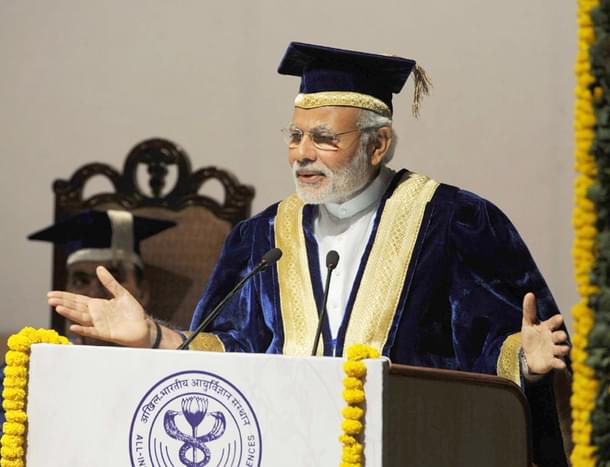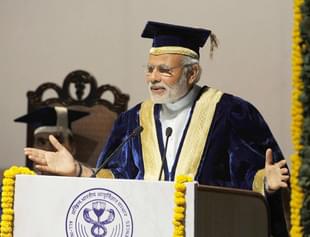Politics
Education Is Much More Than An Ivy League Degree
Harsh Gupta
Oct 12, 2015, 01:38 AM | Updated Feb 11, 2016, 08:57 AM IST
Save & read from anywhere!
Bookmark stories for easy access on any device or the Swarajya app.


As Modi’s honeymoon ends, the class bias of some of his former supporters begins to show.
Aatish Taseer’s column “India’s Great Educational Divide” makes for an interesting read. Taseer questions the basic intellectual wherewithal of the BJP government, starting with Prime Minister himself. Now if it was just one writer, it would hardly matter. However, what you have witnessed here is a fair representation of unease amongst one sub-set of upper-class Modi supporters, who are now looking to wash their hands off a politician they perceived (or pretended) was not a player in any culture war whatsoever.
In any case, Taseer is no ordinary writer. I remember reading his “Stranger to History”, and being mesmerized by his Naipaul-esque travelogues interspersed with autobiographical vignettes. I continued to follow his columns and interviews. Apparently Mr. Taseer has learnt Sanskrit and traveled to Benares in 2014 to shadow Modi’s juggernaut – very sympathetically, it must be added. Now convinced that he is uniquely both non-parochial (by birth) and non-deracinated (by volition), and understandably troubled by recent events in India, Mr. Taseer has decided to do a mini mea culpa on his Modi support.
This is perfectly fine – Modi is an elected leader, and as the one running the government of the world’s largest democracy, he should be scrutinized much more aggressively in my view. Indian leaders get away with deafening silence or unceasing monologue far too easily. However the new critics – instead of being honest about their real source of discomfort i.e. Hindutva – are clinging to spurious excuses; lack of top/foreign degrees in Modi’s cabinet being the latest one. Even excuses might be fine, however this one is especially harmful. And rather self-serving.
Let this be stated loud and clear. You do not have to go to Yale or Oxford (as Taseer implies, or for that matter an IIT or IIM) to run anything – much less the world’s largest companies or countries. Those who have studied even the basics of labor economics (even self-study would do, thank you very much) would understand three key points.
— First, the market value of most top university programs comes not so much from what/how is taught there as from the fact that you successfully cleared a tough screening i.e. signaling (and to some extent, if you did well in said institute compared to your peers) This is especially relevant for generalists – who often become chief executives of various kinds.
— Second, and as a corollary, if you were likely smart and/or diligent enough to get into one of these top universities, it does not actually matter that much if you then attended a much lower ranked university (either because of financial or other reasons). There are studies that suggest this. Whether this would also apply for online degrees is less clear as of now, and whether this applies for Indian open university degrees (say) is also unclear but the basic principle should apply. If you are the same person with the same drive, it does not matter much how/where you get your diploma.
— Last, and perhaps most important, the key increase in human capital happens on the job i.e. via experience and not through top-quality higher (formal) education – you can check growth accounting decompositions for India and China over the last few decades to confirm this. Of course, you have to first get a basic education to get on the job ladder but even the worst critics of the most “parochial” BJP/NDA ministers would not allege a lack of basic schooling in their case. Moreover, as many of India’s ministers are relatively old, this point becomes even more relevant.
The human brain does not like to accept the above; processing counter-factuals (going to a less “prestigious” university) is always difficult. Often a steep university price tag has to be rationalized – the classic sunk cost fallacy. Then what about those friends, that network of high roller acquaintances? What about good old school pride? But the evidence is what it is.
Now, nobody can deny that India’s politicians are hardworking and constantly learning – especially those who do not hail from grand dynasties. Even being cognizant of controversies (most ironically with the HRD minister herself), to put this cabinet as significantly inferior compared to (say) the last one because fewer people went to Oxbridge or MIT (if true) would be just an unsubstantiated assertion..
Apparently, Taseer finds Modi presenting a Biblical phrase as a saying in India deeply embarrassing – the context being the Indian PM refusing to strongly criticizing Russia’s geopolitical adventures given the foreign policy of the West itself. This is apparently clinching proof about Modi’s ignorance. Whereas all it shows is Taseer’s astonishing ignorance about geopolitics – there is no chance that an Indian PM will throw Russia under the bus anytime soon.
In any case, even very astute politicians make gaffes – if you do not believe me, Google “Obama and number of US states” – as they do tend to speak a lot. Of course Bush, who Taseer gives an example of as a Yale alumnus, does not have the reputation of being much of an intellectual – fairly or otherwise. And those who have read “The education of Ronald Reagan” by Thomas Evans would understand that real education is not about a flashy degree but is instead a lifelong process.
But then again – maybe that is not the real beef of some of India’s cosmopolitans who till recently were on Modi’s bandwagon. Their issue is, rightly, with “bigotry” – but which they cannot emphasize too much lest they come across as being willfully blind all along. Yes, there is a culture war going on in India – about what it means to be Indian, and it is not new nor is it ending anytime soon. You can have religious Hindus on the left side of the spectrum and you can have political liberals on the right side. A genuinely educated mind would appreciate that no one person can see or certainly weigh all aspects of the entire “truth”, whatever that is.
For example, certain tragedies are highlighted for weeks and months in India, and certain ones are never mentioned beyond one or two reports – but the humans who suffer or perish in all cases are equally human nonetheless. In the same state of Uttar Pradesh, where Mohammad Akhlaq was recently lynched, a Hindu man called Sonu Singh and a Muslim woman called Danista were killed less than a year ago (both by Danista’s brothers) for the crime of love. Maybe Sonu’s life was indeed worth less because of his religious affiliation in pseudo-secular India, but we as a nation can at least ask why even Danista’s life was worth less than Akhlaq’s? Why did not journalists descend on the murder site of this woman? Hers was an inconvenient story that would not fit the victimhood narrative sold to conservatives who are fighting for cultural separation in the name of inclusive liberalism.
Perhaps what some miss is the veneer of political correctness from some of India’s ministers – and to some extent that is not an unfair expectation in a vast, heterogeneous country such as India. But at least one must understand that what is being demanded is not a change in thinking but a change in utterances. In any case, bigotry is not disappearing – for a ~1.3billion large poor democracy India is doing fine – though of course a lot needs to be improved. Those who think the BJP is the root of the problem could perhaps help misguided BJP supporters by endorsing an alternative.
Should the Batla apologist Kejriwal be given the keys to India’s destiny? What is his tiny party’s views on a common civil code, surely a cornerstone of secularism? Should we vote back the “26/11 RSS ki saazish” Congress into power? Mamata Banerjee who welcomes Ghulam Ali but not Taslima Nasreen? Or Laloo Yadav, who tried to show that the Godhra train attack was not a conspiracy? Or indeed Akhilesh Yadav, under whose reign, communal violence in UP has increased? Let us indeed set aside corruption, economics and foreign policy if you want, India, and just talk secularism. I am all ears if you have a better alternative.
But there is no alternative on the scene yet. For all his faults, Modi remains India’s best bet right now. Yes, the rush of witnessing history in Benares for writers in search of their self does not last forever. After the “revolution”, the devil – and dollops of ennui – lies in the detail. Blame Modi or BJP or Hindutva directly, do not fall on silly props such as Ivy League degrees or lack thereof.
Harsh Gupta is co-founder of Gyanada Foundation and India Enterprise Council. Views expressed are personal, and not that of any employer or institution.
Harsh is an investor, and the coauthor of two books - latest being 'A New Idea of India'.





